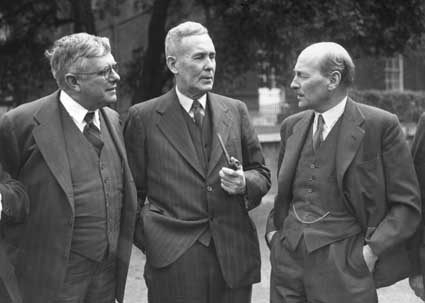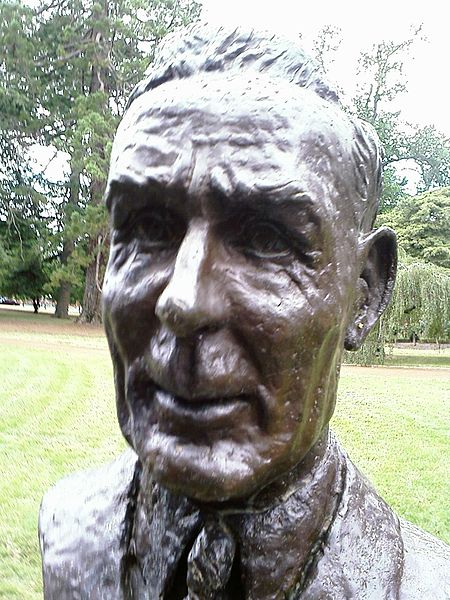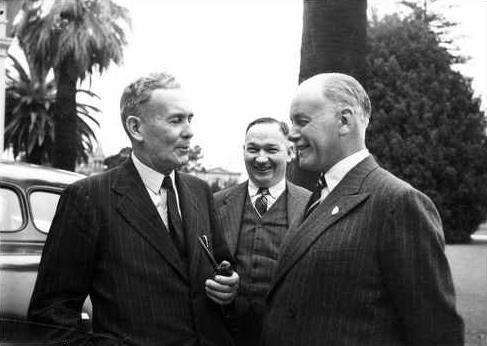<Back to Index>
- Aerospace Engineer Eugen Sänger, 1905
- Painter and Composer Mikalojus Konstantinas Čiurlionis, 1875
- 16th Prime Minister of Australia Joseph Benedict Chifley, 1885
PAGE SPONSOR
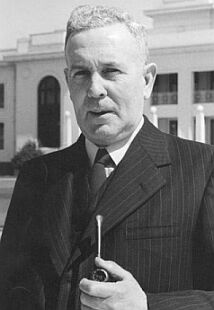
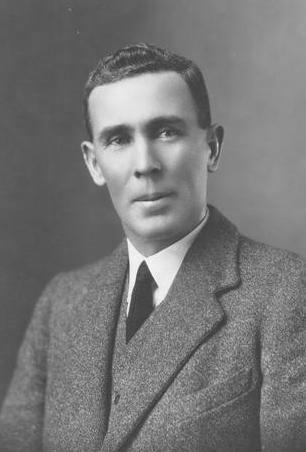
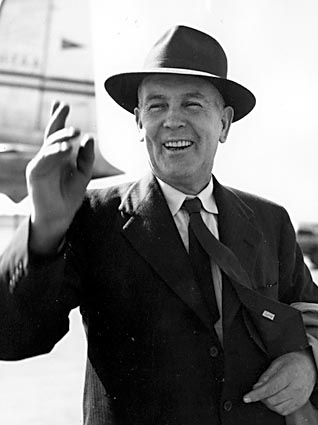
Joseph Benedict Chifley (1885 – 1951), Australian politician, was the 16th Prime Minister of Australia. He took over the Australian Labor Party leadership and Prime Ministership after the death of John Curtin in 1945, and went on to retain government at the 1946 election, before being defeated at the 1949 election.
Amongst the Chifley Labor Government's legislation was the post - war immigration scheme, the establishment of Australian citizenship, the Snowy Mountains Scheme, over - viewing the foundation of airlines Qantas and TAA, improvements in social services, the creation of the Commonwealth Employment Service, the introduction of federal funds to the States for public housing construction, the establishment of a Universities Commission for the expansion of university education, the introduction of a Pharmaceutical Benefits Scheme (PBS) and free hospital ward treatment, the reorganisation and enlargement of the CSIRO, the establishment of a civilian rehabilitation service, the founding of the Australian Security Intelligence Organisation (ASIO), and the establishment of the Australian National University.
One of the few successful referendums to modify
the Australian Constitution,
the 1946 Social Services referendum, took
place during Chifley's term.
Born in Bathurst, New South Wales, Chifley was the son of a blacksmith of Irish Roman Catholic descent. He was one of four brothers and between the ages of five and 14 was raised mostly by his grandfather, who lost all his savings in the bank crash of 1892: Chifley acquired his lifelong dislike of the private banks early. He was educated at Roman Catholic schools in Bathurst, and joined the New South Wales Railways at 15.
Ben Chifley became an engine driver. He
was one of the founders of the AFULE (the
Australian Federated Union of Locomotive Enginemen) and an active
member of the Labor Party. In 1914 he married
Elizabeth Mackenzie. Mackenzie was a staunch Presbyterian, and
the couple exchanged wedding vows in a Presbyterian
church. Chifley remained a practising Catholic, but
his marriage with a non Catholic ignited criticisms
among Catholic circles. In 1917 he
was one of the leaders of a prolonged strike, which
resulted in his being dismissed. He was reinstated by
the Jack Lang New South
Wales Labor government in 1920. He represented his
union before industrial tribunals and taught himself industrial law.
In 1928, at his second try, Chifley won the Bathurst based seat of Macquarie in the House of Representatives. He was in general a supporter of the James Scullin government's economic policies, and in 1931 he became Minister for Defence. At the 1931 general election, the Scullin government fell and Chifley lost his seat. During the Depression he survived on his wife's family's money and his part - ownership of the Bathurst newspaper the National Advocate.
In 1935 the Lyons government appointed him a member of the Royal Commission on Banking, a subject on which he had become an expert. He submitted a minority report advocating that the private banks be nationalised.
Chifley finally won his seat back in 1940, and the following year he became Treasurer (finance minister) in John Curtin's Labor government. Although Frank Forde was Curtin's deputy, Chifley became the minister Curtin most relied on, and he controlled most domestic policy while Curtin was preoccupied with the war effort. He presided over the massive increases in government expenditure and taxation that accompanied the war, and imposed a regime of economic regulation that made him very unpopular with business and the press.
When Curtin died in July 1945,
Forde became Prime Minister, but Chifley defeated
him in the leadership ballot and replaced him only
six days later. Once the war ended, normal
political life resumed, and Chifley faced Robert Menzies and
his new Liberal Party in
the 1946 election, which Chifley
comfortably won. In the post - war years, Chifley
maintained wartime economic controls including the
highly unpopular petrol rationing. He did this
partly to help Britain in
its postwar economic difficulties.
Feeling secure in power, Chifley decided it
was time to advance towards Labor's objective of democratic socialism. According to a
biographer of Ben Chifley’s, his government embarked
upon greater ‘general intervention and planning in
economic and social affairs,’ with its policies
directed towards better conditions in the workplace,
full employment, and an improvement in the
‘equalisation of wealth, income and opportunity'. Amongst other
measures, Chifley passed legislation to establish a
free formulary of essential medicines. This was
successfully opposed in the Australian High Court by
the British Medical Association (precursor
of the Australian Medical Association) Chifley then
organised one of the few successful constitutional
referenda to insert a new section 51xxiiiA which
permitted federal legislation over pharmaceutical
benefits. together
with family allowances, benefits to students and
hospital benefits, child endowment, widows’ pensions,
unemployment benefits, and maternity allowances. The
subsequent federal legislation was deemed
constitutional by the High Court. This paved
the way for the Pharmaceutical Benefits Scheme.
Chifley was also successful in transforming
the wartime economy into a peacetime economy, and
undertook a number of social welfare initiatives, as
characterised by fairer pensions and unemployment and
sickness benefits, the construction of new
universities and technical colleges, and the building
of 200,000 houses between 1945 and 1949. The
achievements of both Chifley’s government and those of
the previous Curtin Government in expanding
Australia’s social welfare services (as characterised
by a tenfold increase in commonwealth expenditure on
social provision between 1941 and 1949 were also
brought together under the Social Services
Consolidation Act of 1947, which
consolidated the various social services benefits,
liberalised some existing social security provisions,
and increased the rates of various benefits. In addition,
tertiary education was also expanded through the
funding of Commonwealth scholarships and the
establishment of the Australian National University and the Commonwealth Education
Office. The radical
reforming nature of Chifley's premiership was such
that between 1946 and 1949, the Australian Parliament enacted
299 bills, a record up until then.
Chifley and his ministers were also able to ensure that Australia’s wartime economy was managed effectively and that post - war debts were minimised. In addition, ex-service personnel were eased back into civilian life (avoiding the hardship and dislocation that had occurred after the end of the First World War), while a series of liberal measures were carried out which bore fruit during the economic boom of the Fifties and Sixties. As noted by one historian, Chifley’s government
“balanced economic development and welfare support with restraint and regulation and provided the framework for Australia’s post - war economic prosperity.“
In 1947, Chifley announced the government's intention to nationalise the banks. This provoked massive opposition from the press, and middle - class opinion turned against Labor. The High Court eventually found Chifley's legislation to be unconstitutional. Chifley's government did, however, succeed in passing the Banking and Commonwealth Bank Acts of 1945, which gave the government control over monetary policy and established the Commonwealth Bank as Australia’s national bank.
In the winter of 1949 a prolonged and bitter strike in the coal industry caused unemployment and hardship. Chifley saw the strike as a move by the Communist Party to challenge Labor's place as the party of the working class, and he sent in the army to break the strike. Despite this, Menzies exploited the rising Cold War hysteria to portray Labor as soft on Communism.
These events, together with a perception that
Chifley and Labor had grown increasingly arrogant in
office, led to the sweeping Liberal election victory
of December 1949. While Labor picked up
four seats in a House of Representatives that had been
expanded to 121 seats, Menzies and the Coalition
picked up 48. The net 44 seat swing to the Coalition
is still the largest defeat of a sitting government in
Australia.
Chifley was now aged 64 and in poor health (like Curtin he was a lifelong smoker), but he refused to retire from politics. Labor had retained control of the Senate, and Chifley, now Leader of the Opposition, took advantage of this to bring misery to the Menzies government at every turn. Menzies responded by introducing a bill to ban the Communist Party of Australia. He expected Chifley to reject it and give him an excuse to call double dissolution election. Menzies apparently hoped to repeat his "soft - on - Communism" theme to win a majority in both chambers. However, Chifley let the bill pass (it was ultimately thrown out by the High Court)
However, when Chifley rejected Menzies' banking bill a few months later, Menzies called a double dissolution election in April 1951. Although Chifley managed to lead Labor to a five seat swing in the House, Labor lost six seats in the Senate, giving the Coalition control of both chambers.
A few weeks later Chifley died
of a heart attack in his room at the Kurrajong
Hotel in Canberra (he
had lived there throughout his prime ministership,
having refused to reside at The Lodge). Menzies heard of
Chifley's demise while attending an official event
at the Albert Hall in Canberra, to mark fifty
years of Australian
Federation. Normally impassive, "Ming the
Merciless" (as his foes called him) had difficulty
on this occasion in fighting back tears; and he
ordered that the function be brought to an end, in
homage to his predecessor and adversary, whom he
had always respected personally.
More than 30 years after his death, Chifley's name still aroused partisan passions. In 1987 the New South Wales Labor government decided to name the planned new university in Sydney's western suburbs Chifley University. When, in 1989, a new Liberal government renamed it the University of Western Sydney, controversy broke out. According to a debate on the topic, held in 1997 after the Labor Party had regained government, the decision to rename Chifley University reflected a desire to attach the name of Western Sydney to institutions of lasting significance, and that idea ultimately received the support of Bob Carr, later the Premier of New South Wales.
Chifley had lived apart from his wife for many years: his secretary, Phyllis Donnelly, was with him when he died. Long held suspicions that she had been his lover were confirmed in David Day's 2001 biography.
"I try to think of the labour movement, not as putting an
extra sixpence into somebody's pocket, or making
somebody Prime Minister or Premier, but as a
movement bringing something better to the people,
better standards of living, greater happiness to
the mass of the people. We have a great objective
- the light on the hill - which we aim to reach by
working the betterment of mankind not only here
but anywhere we may give a helping hand. If it
were not for that, the Labour movement would not
be worth fighting for." (excerpt from "The Light on the Hill" speech, 12
June 1949)
